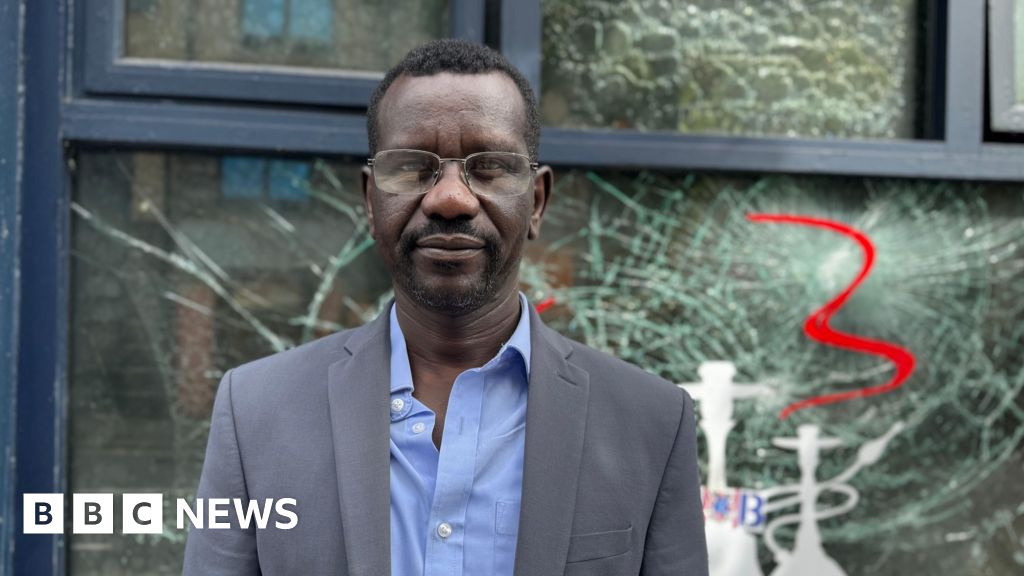“It’s not easy to stay here—more for my life and my safety; I can’t try over and over again with the same result.”
Mohammed Idris, who owns Bash café, in south Belfast, says he will not reopen after his business was set alight during violent protests.
Disorder broke out after an anti-immigration protest in the city on Saturday.
Mr Idris has told BBC News NI his businesses have been targeted before, saying his shop on Sandy Row was targeted last year.
“My computer shop was completely damaged just like this café. This café was a hope, a place for a community – there is no hope here now.”
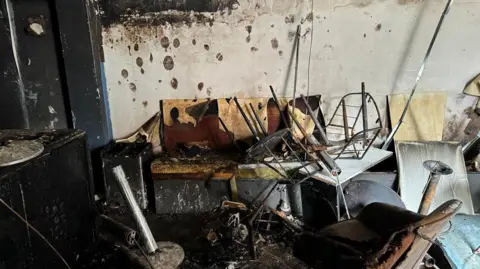
Recounting the night his cafe was attacked he says a group of people “shouted my name, ‘Where is Mohammed?’, then they smashed all windows on the ground floor.”
However, he told BBC News NI that the worst came overnight when his business was set on fire.
“For me it’s not easy – it is so difficult when they know your name. It’s scary – my life threatened. A group of people coming – shouting my name, just people who came from different areas.”
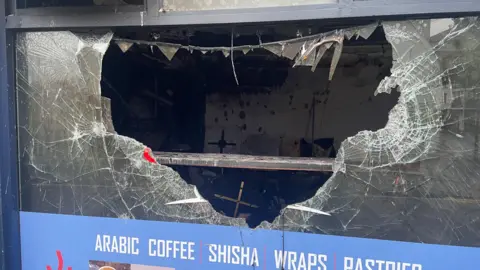 PA Media
PA MediaMohammed Idris has lived in Belfast since 2002, but says living here has become “more difficult” in recent years.
“We have to make our life here, but now all our friends, everyone is asking ‘where do we go now?’
“We come from different countries – there are wars in our countries – what do we do now?”
‘Did I do something to you?’
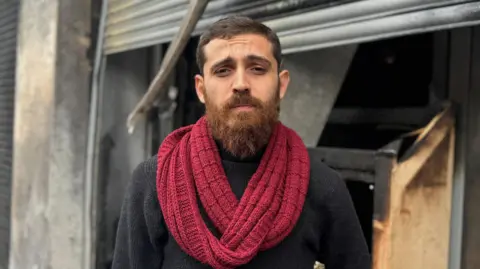
A supermarket manager in Belfast said his business had been reduced to “ashes” after it was also targeted.
Bashir said police officers advised him to close the Donegall Road business on Saturday afternoon.
At about midnight, he returned to the shop after a friend informed him it was on fire.
He waited for more than three hours before entering the premises, which he said was “like a disaster”.
“Not a single thing [could be saved], nothing,” he said.
“[There was] water coming from the roof, all the groceries were gone, I mean everything.
“I was like: ‘Should I cry or should I laugh?'”
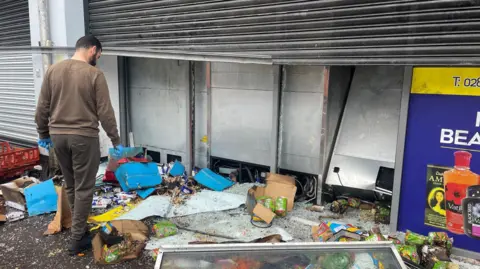 PA Media
PA MediaThis is the third time Sham Supermarket has been targeted. Bashir said “nothing” has been done to protect them.
“If the police would do something they would do it from the first time when this shop has been burned,” he added.
Bashir also criticised police for their response to the violence and questioned why Muslim businesses were being deliberately targeted.
Social media also had a large part to play in the weekend riots, Bashir said.
“I believe those people are brainwashed… somebody is giving them instructions to do all of that, suddenly it was all planned over in England, not only in Belfast.
“People believe [social] media too much – giving them the wrong idea about this community.”
Community asking what’s next
He alleged that the police “couldn’t stop the fire” or those responsible.
“They let the people burn our shops… where are the PSNI? If the police cannot stop those people, who’s going to do that? Me? Of course not.”
The shop manager said his mind “is empty” and he is struggling to sleep.
“I’m asking myself what’s next? For the first time in my life I don’t have any goal. Should I continue, should I rebuild it, should I move?”
He added he is proud to be a Muslim and wants to know why he was targeted.
“My question is: Did me, Bashir, do something to you?
“If you don’t know anything about me, you hurt me? That’s absolutely ridiculous.”
‘A police failing’
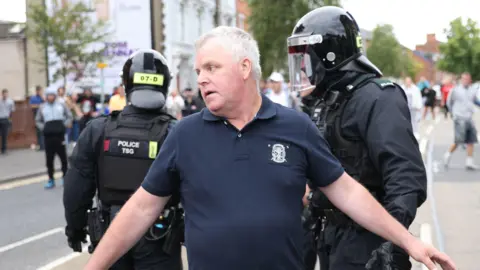 PA
PAGerard Rice from the Lower Ormeau Residents Action Group tried to defuse the situation on Saturday.
He said when he saw the crowd heading along University Avenue towards the area, he was “surprised at the numbers”.
He described it as “an angry mob of two to three hundred people”.
“I didn’t expect to see what I saw… some of the ones who were coming down the street had bricks and bottles,” he continued.
Mr Rice described how people were very frightened and how he was concerned that protestors would head towards businesses in the Lower Ormeau Road area.
“The police were coming behind them, they weren’t directing them,” he added.
Residents and people in the area gathered to try and stop the protestors.
Mr Rice said he feels there was “definitely a police failing”.
He said: “The marchers at one point weren’t moving on. The police formed a line and were facing the community and nearly allowing the marchers to continue on…it could have been all over in minutes.
“There was a point when police were facing residents who were saying: ‘Just take them away from our community, just take them away’.”
Migration in Northern Ireland
Northern Ireland generally has low rates of immigration.
This is illustrated by the 2021 census, which showed about 6% of the population had been born outside the UK or Ireland, and almost 97% of people described their ethnicity as white.
Annual movement of people is usually expressed as net migration: the difference between the number of people arriving (immigrants) and those leaving (emigrants).
In 1972, the worst year of the early Troubles, net emigration was almost 24,000 people.
The peak year for net immigration was 2007 when it reached almost 11,000 people.
The most recent figures are for 2022 and show net migration of 2,300 people.
Further analysis of that figure shows there was net emigration of 2,700 people to other parts of the UK, but net immigration of 5,000 people from the rest of the world.

